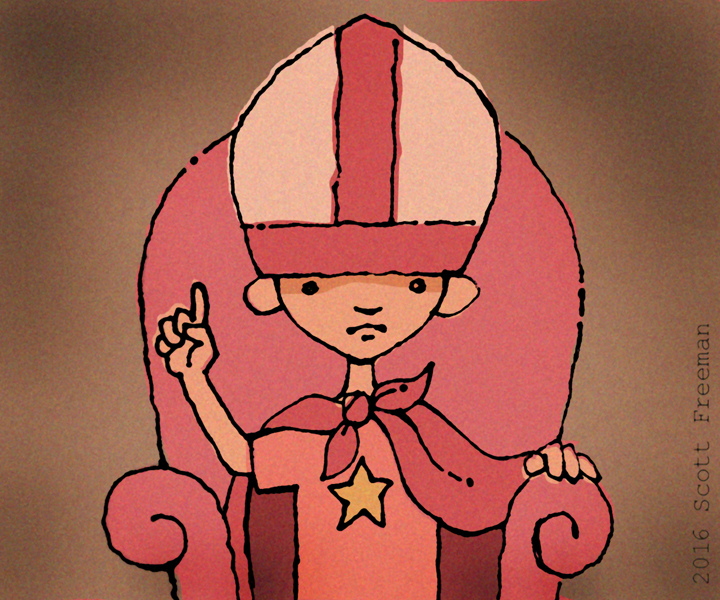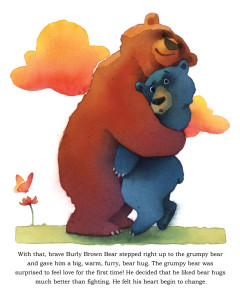
Does this ring a bell? This was a frequent issue for Mollie and me. We are both artists and, I would say, intentionally on the non-legalistic end of the spectrum of conservative evangelical culture. But somehow we produced a couple of children with an overdeveloped sense of how everyone else should behave.
One child in particular seemed to feel he should be the Jiminy Cricket of the whole family. (And, perhaps the neighborhood, church, and world.) The issue came up with the other four as well, just not on a daily basis.
Of course, I was pleased to see that this child had a strong sense of right and wrong. He was also very bright, articulate, and overconfident. To compound his situation further, he was the second oldest, and his older brother had a disability. You can imagine how sorely tempted he was to constantly “help” those around him. Especially given that he had a younger brother who was apparently born without a conscience, (but that’s probably a story for another time.)
I’m guessing you’ve seen this in your own kids, or in other “church kids” as well. They’re good kids, but they’re kids, so of course they’re still finding balance. This tension is understandable because we’ve been teaching them that there is such a thing as right and wrong. We don’t want them to believe that “everything is relative.” We don’t buy into the idea that “you have your truth and I have mine.” We want our kids to grasp the idea of an objective Creator who has created a world where objective right and wrong, and truth exist.
So how do we raise them to not come off as judgmental little twerps, yet without undermining their developing worldview?
Here are four ideas that we consciously employed. We don’t have all the answers, so please feel free to contribute your helpful thoughts in the combox below.
1) Unsolicited help and advice is usually unwelcome
“If a person doesn’t want your help, your help will not be accepted as help.”
We had to emphasize this about a million times with our kids. A couple of them seemed genuinely amazed that their interventions were not always welcome. After all, if one person is right and another person is wrong, the wrong person will surely want to know about it. Right?! This turned out to be at the root of a large percentage of sibling squabbles in our home.
This also happens to be one of those principles that continues to serve us all well in adulthood.
2) Authority roles
I think it’s worth explaining things to kids that we as adults have come to take for granted. Authority roles is a big one. The Bible teaches that God has instituted 3 spheres of life with clear authority roles: the state, the church, and the family. Gently but clearly, I would often explicitly spell out to a child, usually in the presence of the others, something like this:
“(Child’s name,) did you notice that your mom and I are sitting right here, and we did not correct your sister/brother? I don’t want you to correct her/him either. You are not the dad/mom. You have no authority over your sister/brother.”
Sometimes we had to remind them that they were not police officers either.
3) Family identity
Your family has an identity and a collective “self-image” that each family member shares. When our children are small, they accept this identity to the extent that they understand it. We sometimes felt it necessary to differentiate our family from many of those around us. Not for the sake of creating division or ill will, but because there was a lot of bad stuff going on around us, and we parents weren’t necessarily doing anything about it.
I should explain that we lived in an inner city neighborhood where there was a lot to criticize, even from a child’s perspective: lots of family dysfunction, lying, stealing, swearing, smoking, meanness, fighting, substance abuse, cruelty, vandalism, litter, and so on.
Our stated explanation of our identity would go something like this:
“Our family loves and follows Jesus. Many other families don’t. This is sad for them, but we can’t make them follow Jesus. The best way for us to help them is to be kind to them, and let them see how great Jesus is, not to always be telling them what they are doing wrong.”
Within the church it can be a bit trickier, since we are all professing Jesus:
“Their family is also trying to follow Jesus, but they understand that a little differently than we do. We’re all trying to follow Jesus, so we trust each other. We trust that we’re all trying our best. As a kid, God wants you to obey your mom and dad. That’s your job right now. When you have your own family someday you can do things differently.”
4) Parental example
I believe this may be the most important for the long term. I think a contradictory parental example can undo a lot of good instruction. So Mollie and I tried not to “boss around” each other or our adult friends. Even with our kids, when it was appropriate we would ask them if they would like help when we could see that they needed help. If the answer was no, and the situation wasn’t life threatening to anyone, we would wait until they were ready to receive help. We didn’t want to leave them with the impression that being in authority means you get to boss people around. (Not that there isn’t a place for this in parenting, of course.)
As an older, wiser friend of mine used to say, “More is caught than is taught.”
Part of our privilege as parents is to help our kids navigate life more effectively than they would without our wisdom. May God give you grace as you help your kids reach a place of balance!








